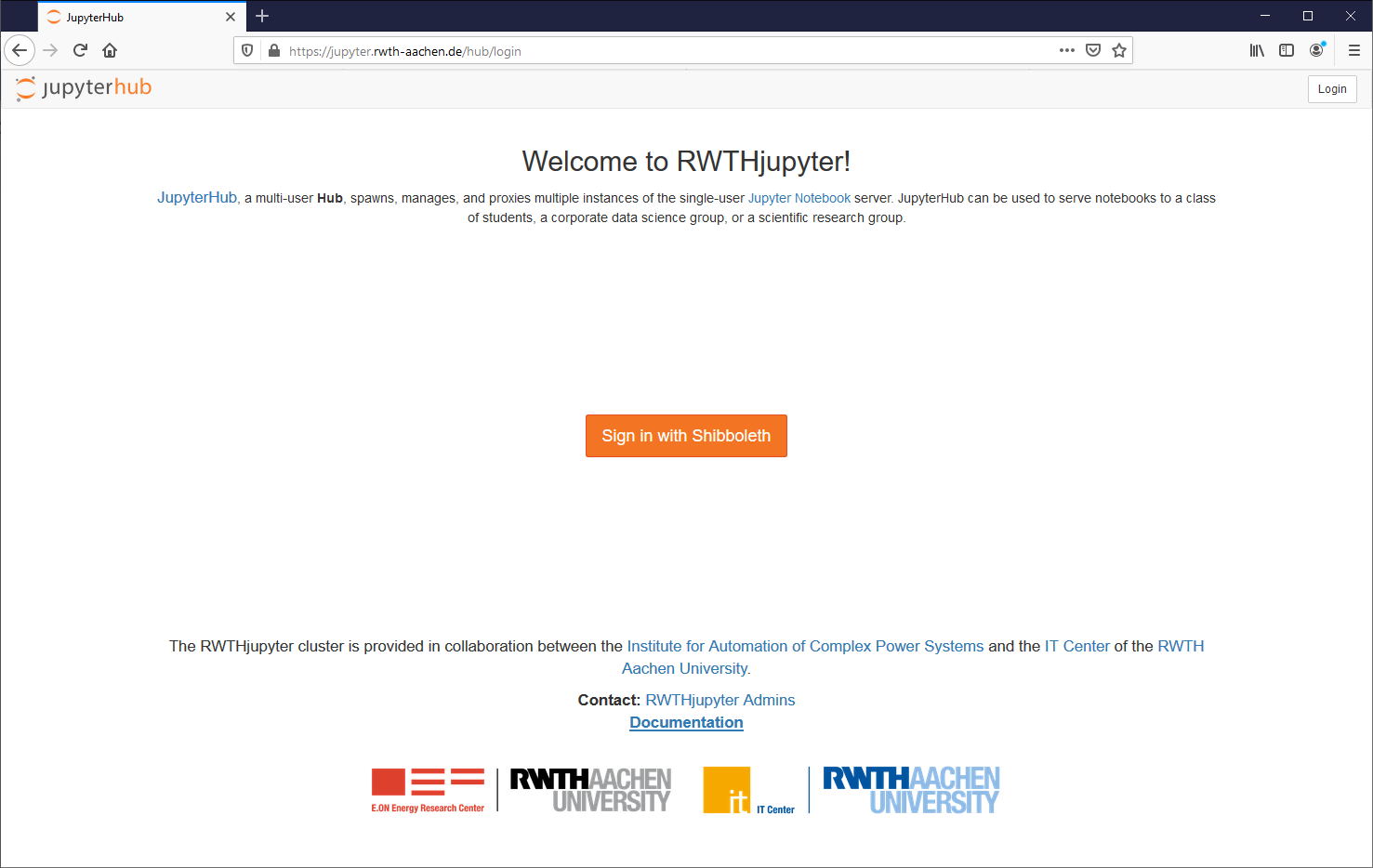We already presented the test operation of the JupyterHub at RWTH Aachen University a few weeks ago on the IT Center Blog. So far, the JupyterHub cluster has only been in the test phase. Now it will grow into a new service! For this purpose, the service with the beautiful name “RWTHjupyter” will enter the pilot phase on February 22, 2021.
At the start of the pilot phase, we’ll give you a closer look at what RWTHjupyter can do and where the seemingly unusual name comes from.

Welcome to RWTHjupyter!
Source: RWTHjupyter
What happened so far…
The RWTH JupyterHub was designed in 2019 in a first step in a cooperation between the Institute for Automation of Complex Power Systems (ACS) of the eon.erc and the IT Center for the application area teaching at RWTH. In April 2020, the test operation of the JupyterHub cluster started with a small group of selected users from RWTH.
The provision of the JupyterHub test instance has so far been based on a division of labor: The IT Center provided the necessary server infrastructure as part of the existing Physical Server Hosting service and provided simple operational support with the corresponding experience. Based on this, the deployment of the JupyterHub software was carried out by the ACS.
Due to the increasing interest and the growing demand within RWTH Aachen University in the field of teaching, the offer is now transferred to the service RWTHjupyter. By establishing this service at the IT Center, the infrastructure for Jupyter notebooks for researchers, lecturers, and students at RWTH Aachen University will be stabilized.
What can RWTHjupyter do?
RWTHjupyter is an interactive computing platform built on top of the JupyterHub cluster to deliver Jupyter Notebooks. Jupyter Notebooks is an open source web application that allows documents to be created and shared via live code web application. Deployment options include documents with dynamic source code, equations, visualizations, and supporting text. JupyterHub also offers the possibility to work independently of operating system and end device as well as in different programming languages. Possible applications include data cleaning and transformation, numerical simulation, statistical modeling, data visualization, machine learning and much more.
A major advantage of Jupyter Notebooks is that students can tackle complex tasks even if they have little or no programming knowledge. For this purpose, students are provided with a pre-built Jupyter Notebook by lecturers. However, the notebooks can also be used by students outside of courses, although they must install them themselves. In the event of a resource shortage, however, courses have priority.
Good to know: Where does the name come from?
Have you ever wondered where the “Jupyter” in RWTHjupyter comes from?
The word is a mix of the names of the programming languages Julia, Python and R: Ju-Pyt-(e)R. In addition, it is meant to remind of Galileo Galilei, who had created various notebook entries with observations and measurement data for the discovery of Jupiter’s moons. This idea of the notebook is reflected in the Jupyter Notebooks. [*]
Besides the programming languages mentioned above, it is also possible to program in C++ and Java.
What do I have to do to be able to use RWTHjupyter?
RWTHjuypter is available for all members of RWTH Aachen University from the pilot phase on, provided that you are enrolled or employed at RWTH Aachen University. The terms of use can be found on IT Center Help.
How is RWTHjupyter used in everyday university life?
For lecturers, the digital learning materials, which can be changed dynamically, are a successful way to get more involved in practice instead of just teaching theory. For example, real weather data can be used for analysis and simulation purposes. Teaching content becomes much more interactive. In addition, the digitalization of teaching at RWTH Aachen University is supported.
For courses of study that deal with and use programming languages in particular, the form of coding with simultaneous explanation and reference function is naturally very interesting. In the Jupyter Notebooks code can be stored and directly described with text and graphics.
Through the Jupyter Notebooks, teaching can go new ways. Scripts can also be changed dynamically and can serve as a basis for collaboration. So in principle there is “something for everyone”.
…and what happens now?
Before the service can go into regular operation, first the pilot phase takes place: On Monday, February 22, 2021, the test phase officially ends with the start of the pilot phase. The aim is to ensure a stable process in the subsequent regular operation by building up experience, taking over operations and setting up support structures.
In the long term, support will be provided through the established channels of the IT Center: The documentation for RWTHjupyter on IT Center Help and the IT-ServiceDesk will be your first point of contact.
After the successful test phase, the Institute for Automation of Complex Power Systems (ACS) will continue to be available for development and application support during the pilot phase. However, while the processes are being expanded and reorganized as part of the pilot phase, the development and provision of new features will be put on hold for the time being in order to focus initially on establishing what already exists.
Contact for questions about RWTHjupyter
For questions about RWTHjupyter please contact the IT-ServiceDesk.
For announcements and interaction around the RWTHjupyter installation there is a RWTHjupyter usergroup mailing list: jupyter@lists.rwth-aachen.de.
Responsible for the content of this article are Linda Jörres, Dörte Rosendahl and Tanja Wittpoth-Richter.
—
[*] https://de.wikipedia.org/wiki/Project_Jupyter





Super! Freut mich, dass wir über das IT Center jetzt eine lokale und vertrauenswürdige Jupyter-Instanz haben. Als nächstes dann Overleaf / ShareLaTeX?
Hallo Benedikt,
vielen Dank für das positive Feedback, das freut uns sehr!
Unsere Kolleginnen und Kollegen beschäftigen sich bereits mit weiteren Anwendungen wie zum Beispiel Overleaf und prüfen, welche geeigneten Möglichkeiten es für die Anforderungen der RWTH gibt.
Über Neuigkeiten informieren wir natürlich zu gegebener Zeit. 🙂
Viele Grüße,
das IT Center Blog Team